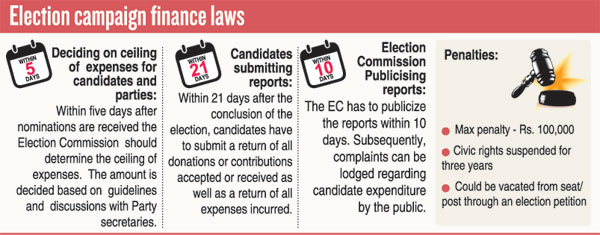News
Campaign Finance Act: Top EC official laments non-inclusion of tough punishment
View(s):
By Dilushi Wijesinghe
The Commissioner General made this statement at a programme held at the Sri Lanka Press Institute (SLPI) on Monday.
Under the existing laws, a candidate violating the Act could be liable to a maximum fine of Rs 100,000, suspension of civic rights for three years, or being unseated through an election petition.
Mr. Ratnayake explained that they proposed that civic rights should be suspended for seven years as a candidate violating the Act could contest again in the next election as an election term exceeds the suspension period.
“Most of what we proposed did not make it to the Act,” he said.
Mr Ratnayake said that discussions to manage election campaign finances began in 2014 with civil society participation.
“In 2018, the draft came in the form of a cabinet paper to Parliament twice but was not passed. But during the last local council election, we found it had suddenly been passed, and we didn’t even know,” he said.
He acknowledged that although there were shortcomings in the Act, it provided a legal basis for the regulation of election expenses and drew attention to transparency in campaign financing.
Chinthaka Kularatne, Additional Election Commissioner in Charge of Legal and Investigations, discussed the contents of the Act, going into detail on key sections such as the method of expenditure calculation.
The EC’s Research and Planning Director, Channa de Silva, explained the different institutions involved in the implementation of the Act and their responsibilities, while Deputy Election Commissioner (Electoral Dispute Resolution) Piyumi Atigala explained the responsibilities of the media in reaching citizens at the ground level and the responsibilities of citizens in educating themselves on elections and voting.
The Act covers local council, parliamentary, presidential, and provincial council elections, Executive Director of the Institute for Democratic Reforms and Electoral Studies (IRES), Manjula Gajanakake said.
Commenting on the punishments faced by candidates violating the Act, he said, “The punishments are the same for all types of elections. The maximum penalty for violation is 100,000 rupees.”
The programme began with SLPI’s Chief Executive Officer Kumar Lopez highlighting the importance of understanding campaign financing and the laws that govern it.

The best way to say that you found the home of your dreams is by finding it on Hitad.lk. We have listings for apartments for sale or rent in Sri Lanka, no matter what locale you're looking for! Whether you live in Colombo, Galle, Kandy, Matara, Jaffna and more - we've got them all!

